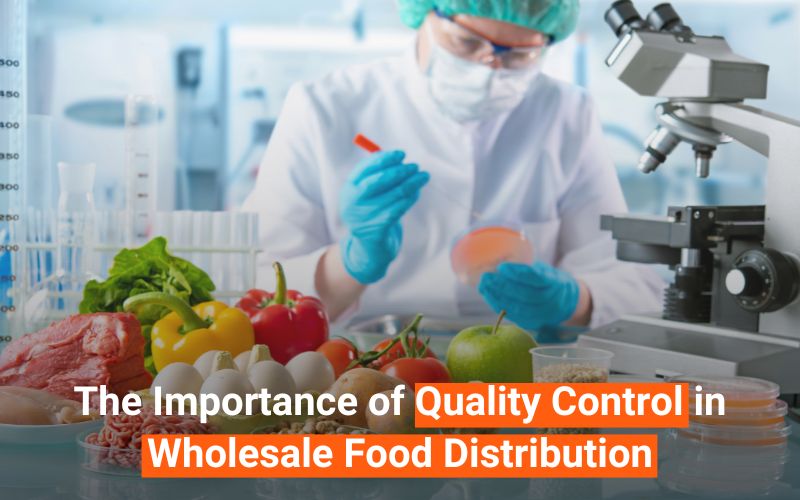Wholesale food distribution is a complex and important industry that provides food products to retailers, restaurants, and other foodservice providers. Wholesale distributors source, store, and transport a variety of food items ranging from fresh produce and meats to packaged goods and canned foods. With the food industry being highly regulated, it is crucial that wholesale food distributors implement a robust quality control program to ensure the safety and quality of their products.
In this blog, we will discuss the importance of quality control in wholesale food distribution, the benefits of implementing a quality control program, the components of a quality control program, and the challenges and solutions in implementing a quality control program.
Importance of Quality Control in Wholesale Food Distribution:
The importance of quality control in wholesale food distribution cannot be overstated. Ensuring the safety and quality of food products is critical for maintaining customer trust and safety, preventing foodborne illness outbreaks, and complying with food safety regulations. Without a quality control program in place, wholesale food distributors run the risk of selling contaminated or subpar products, which can lead to negative health outcomes and legal liability. Implementing a quality control program is an investment in the safety and success of a wholesale food distribution business.
The Benefits of Quality Control in Wholesale Food Distribution:
Here are the main 3 benefits of Quality Control in Wholesale Food Distribution:
1. Ensure the safety and quality of food
The primary benefit of implementing a quality control program in wholesale food distribution is to ensure the safety and quality of food products. Quality control measures such as monitoring, testing, and record-keeping can help detect and prevent contamination, spoilage, and other quality issues before they reach customers.
2. Maintain customer satisfaction
Consistently providing high-quality food products can increase customer satisfaction and loyalty. When customers trust that a wholesale food distributor prioritizes quality control, they vo9 are more likely to continue purchasing from them.
3. Reduce waste and increase profits
Implementing a quality control program can help wholesale food distributors reduce waste and increase profits. By monitoring and testing products for quality issues, distributors can catch potential problems before they result in spoilage or waste. This can lead to cost savings and increased profitability.
The Components of a Quality Control Program:
1. Training and education
The first step in implementing a quality control program is to train employees on food safety and quality control practices. Employees should understand the importance of quality control and be trained on how to identify and report quality issues.
2. Standard operating procedures
Standard operating procedures (SOPs) outline the steps that employees should take to ensure the safety and quality of food products. SOPs should cover everything from receiving and storing products to monitoring and testing for quality issues.
3. Monitoring and testing
Wholesale food distributors should implement monitoring and testing programs to detect quality issues such as contamination, spoilage, and other defects. This can include visual inspections, temperature monitoring, and microbiological testing.
4. Corrective actions
When quality issues are detected, it is important to take corrective action to prevent the issue from reoccurring. Corrective actions can include disposing of contaminated products, adjusting storage or handling procedures, and improving employee training.
Challenges and Solutions in Implementing a Quality Control Program:
Yes, implementing a quality control program in Wholesale Food Distribution can be challenging. There are several factors that can make it difficult. Let’s take a closer look at these challenges and potential solutions:
1. Limited Resources
One of the biggest challenges that small wholesale food distributors face is the lack of resources to invest in a robust quality control program. However, there are solutions to this challenge. Outsourcing quality control to a third-party provider can be a cost-effective way to implement a quality control program. Additionally, implementing a simplified program can also be effective, as long as it includes the essential components such as employee training, standard operating procedures, and monitoring and testing programs.
2. Resistance to Change
Employees may be resistant to changing established procedures. To overcome resistance, it is important to communicate the benefits of quality control and provide training to ensure that employees are comfortable with new procedures. Additionally, involving employees in the development of the quality control program can increase their buy-in and participation.
3. Collaborating with Suppliers
Wholesale food distributors rely on suppliers to provide high-quality products. Collaborating with suppliers on quality control measures can help ensure that products meet the required standards. This can include requesting certificates of analysis or certificates of compliance, conducting supplier audits, and requiring suppliers to implement their own quality control programs.
4. Continuous Improvement
Finally, implementing a quality control program is an ongoing process that requires continuous improvement. This means reviewing and updating procedures regularly, monitoring performance, and making adjustments as needed. Additionally, conducting regular audits and inspections can help identify areas for improvement and ensure that the quality control program is effective.
So implementing a quality control program in wholesale food distribution can be challenging, but the benefits are clear. By addressing the challenges and implementing effective solutions, wholesale food distributors can ensure the safety and quality of their products, and increase profits.
Read More: Best Kitchen Cleaners Wholesale Suppliers in the UK
Conclusion:
In conclusion, quality control is essential in wholesale food distribution to ensure that products meet the required standards for safety and quality. Implementing a quality control program can be challenging, but the benefits are numerous. The key components of a quality control program include employee training, standard operating procedures, monitoring and testing programs, and continuous improvement. Overcoming the challenges associated with implementing a quality control program, is critical to ensuring the success of the program. By prioritizing quality control, wholesale food distributors can enhance their reputation, build customer loyalty, and achieve long-term success.





